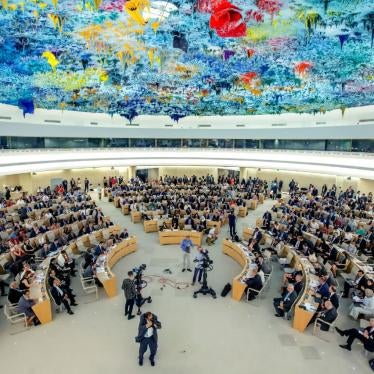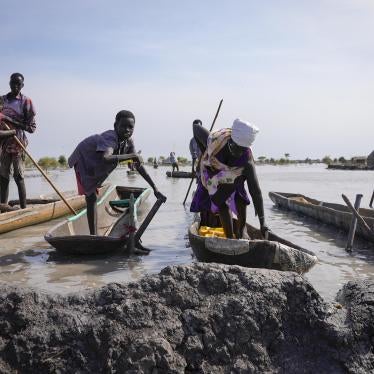Geneva, 6 March 2015
The undersigned non-governmental organizations write to urge your delegation to ensure that the Council addresses the serious, widespread and ongoing violations and abuses of international human rights and humanitarian law committed in South Sudan in a manner which reflects the gravity of the situation in the country by adopting a resolution that would:
- Condemn in the strongest terms violations of international humanitarian law, crimes under international law which may amount to war crimes and crimes against humanity, and other serious violations and abuses of international human rights law;
- Establish a Special Rapporteur on South Sudan with a mandate to monitor and publicly report on violations of international humanitarian law and violations and abuses of international human rights law, make recommendations for achieving effective accountability for past and ongoing crimes, including through the establishment of transitional justice mechanisms; provide technical assistance to any new mechanisms and request the mandate holder to work in close cooperation with other international mechanisms such as the UN Mission in South Sudan (UNMISS), the Intergovernmental Authority of Development (IGAD), and the African Union to promote human rights and accountability;
- Call on the parties to the conflict and IGAD mediators to exclude amnesty for crimes under international law and to support the establishment of a vetting system to ensure that members of the South Sudanese military and security personnel about whom there is evidence of serious human rights violations do not remain, or are not placed in, positions where they could repeat such violations;
- State the need for thorough, impartial and effective investigations and prosecutions of all those suspected of criminal responsibility for crimes committed in violation of international law, in accordance with international standards without recourse to the death penalty;
- Call on South Sudan to commit to accountability and for United Nations, African Union, and South Sudan to take steps to ensure fair, credible trials through establishment of an independent hybrid judicial mechanism and/or investigations by the ICC;
- Call on South Sudan to accede to the Rome Statute and consider making a declaration under article 12 (3) of the Statute granting the ICC jurisdiction over crimes that have occurred during the conflict;
- Emphasize the importance of the speedy public release of the final report of the African Union Commission of Inquiry on South Sudan (AUCISS);
- Call on South Sudan to complete the process of accession to the Convention against Torture and Other Cruel, Inhuman or Degrading Treatment or Punishment (CAT) and its Optional Protocol, the Convention on the Elimination of All forms of Discrimination against Women (CEDAW) and its Optional Protocol, and the Convention on the Rights of the Child (CRC) and its Optional Protocols on the involvement of children in armed conflict and on the sale of children, child prostitution and child pornography by depositing instruments of accession with the Secretary-General of the United Nations;
- Reiterate earlier HRC calls for UNMISS to report publicly and regularly on the human rights situation in South Sudan.
Since the outbreak of the conflict on 15 December 2013, gross violations and abuses of human rights and serious violations of international humanitarian law have occurred on a massive scale, with devastating consequences for the civilian population, including the deaths of tens of thousands of civilians and the displacement of almost 2 million people. UNMISS has reported that serious violations of humanitarian law and violations and abuses of international human rights law have been committed by both parties to the conflict, including extrajudicial killings, enforced disappearances, rape and other acts of sexual violence, targeted attacks against civilians and non-combatants. There are ‘reasonable grounds’ to believe crimes against humanity have also occurred. UNMISS has also recommended that national processes to provide justice be complemented by international assistance through a hybrid or special court.[1]
Abuses have been documented by Amnesty International,[2] the International Federation for Human Rights (FIDH),[3] and Human Rights Watch,[4] including war crimes and crimes against humanity. Various regional initiatives have been undertaken to bring the crisis to an end. The African Union Commission of Inquiry on South Sudan (AUCISS), mandated to investigate the human rights violations and other abuses and make recommendations for accountability, reconciliation and healing, submitted its final report to the African Union at the end of 2014. We have called for the immediate publication and dissemination of this report, however its consideration has been deferred, and no clear date set for such consideration. The Inter-Governmental Authority on Development (IGAD) and the parties to the conflict have emphasized the importance of criminal accountability and the need to exclude individuals responsible for serious crimes from serving in a future government. The 1st February 2015 agreement envisages the establishment of a Truth, Reconciliation and Healing Commission, and a hybrid judicial mechanism.
The Human Rights Council's resolution on South Sudan adopted during its 26th session under agenda item 10,[5] focused more on technical and capacity-building assistance than on the need for accountability for violations of international humanitarian law and violations and abuses of international human rights law. It is critical that the Council enhance its engagement on the situation in the country. During the high-level Panel Discussion on South Sudan that took place at the Council's 27th session numerous delegations called on the Council to consider the creation of a special procedure mandate, in the form of a Special Rapporteur, to monitor and publicly report to the Human Rights Council on the human rights situation in South Sudan.[6]
The 5 March deadline imposed by IGAD on the parties for reaching a final agreement has now passed, with little apparent progress and fighting continuing, particularly in Upper Nile and Unity states. It is thus important that the Human Rights Council takes strong action on South Sudan during this session.
We thank you for your attention to these pressing issues.
Sincerely,
Amnesty International
Community Empowerment for Progress Organization (CEPO)
East and Horn of Africa Human Rights Defenders Project (EHAHRDP)
International Federation for Human Rights (FIDH)
Human Rights Watch
South Sudan Law Society (SSLS)
[1] United Nations Mission in the Republic of South Sudan (UNIMISS), Conflict in South Sudan - A Human Rights Report' 8 May 2014, paragraph 8.
[2] Amnesty International, Nowhere Safe: Civilians under Attack in South Sudan, May 2014.
[3] FIDH, South Sudan: “We Fear the Worst”', Breaking the cycle of violence and impunity in South Sudan to prevent chaos, December 2014.
[4] HRW, Ending the Era of Injustice: Advancing Prosecutions for Serious Crimes Committed in South Sudan's New War, 11 December 2014.
[5] Human Rights Council, Resolution 26/31, Technical and capacity-building assistance for South Sudan in the field of human rights, 27 June 2014, http://ap.ohchr.org/documents/dpage_e.aspx?si=A/HRC/RES/26/31.
[6] Human Rights Council, Document A/HRC/28/53, Panel discussion on the human rights situation in South Sudan: Report of the United Nations High Commissioner for Human Rights, 8 January 2015, paras. 26 and 38.







